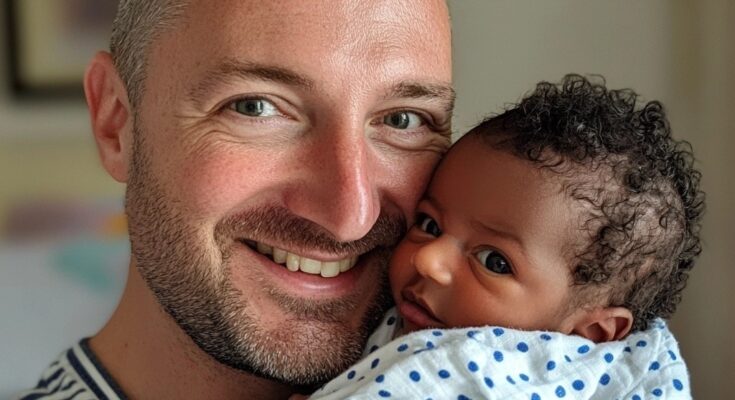The delivery room was filled with an almost electric anticipation. My wife, Emma, lay on the hospital bed, her fingers gripping mine tightly, her face a mixture of exhaustion and exhilaration. The rhythmic beeping of the monitors, the hushed voices of the nurses, and the soft words of encouragement from the doctor all blended into a surreal moment.
The Moment That Changed Everything
This was it. The moment we had been waiting for.
Nine months of anticipation—of tiny kicks in the middle of the night, of nursery decorations, of daydreams about whose features our baby would inherit. Would she have Emma’s golden curls? My sharp cheekbones? The dimples passed down through generations?
Then, a piercing cry shattered the quiet, cutting through the weight of the moment.
Our baby had arrived.
I turned just in time to see the doctor lift our daughter, her tiny limbs wiggling, her face scrunched up in protest at this strange, new world. My breath hitched, my heart swelled—she was perfect. But before I could reach for Emma’s hand, her panicked voice tore through the room.
“This isn’t my baby!”
Silence.
Nurses froze mid-motion. The doctor hesitated. I turned to Emma, expecting exhaustion, maybe the haze of labor, but her wide eyes weren’t just dazed—they were full of disbelief.
A nurse, ever gentle, attempted to soothe her. “She’s still attached to you,” she said, as if that simple fact would dissolve the confusion.
But Emma shook her head violently, her breathing uneven. “No—you don’t understand. It’s not possible! I’ve never been with a Black man!”
The words landed like a thunderclap. The air turned heavy. My pulse pounded as I turned to our daughter, my perfect little girl—her skin noticeably darker than ours. But her features… they were ours.
Emma trembled beside me, her entire world tilting under the weight of something she couldn’t comprehend. I tightened my grip on her hand, anchoring her to me. “She’s our baby,” I said, my voice steady, unwavering. “That’s all that matters.”
Her frantic gaze darted between me and the tiny, wriggling bundle in the nurse’s arms. Then, slowly, hesitantly, the nurse placed our daughter against Emma’s chest.
For a moment, Emma remained rigid, afraid to move, afraid to accept. But then—our daughter’s tiny fingers curled around her pinky. A fragile, instinctive grip. Something shifted.
Emma’s shoulders sagged. Her expression softened. Tears welled in her eyes, a silent mixture of exhaustion, love, and something unspoken. She exhaled a shaky breath.
“She’s beautiful,” she whispered.
The tension in the room broke. The nurses exchanged glances but carried on with their work. The doctor met my eyes and gave a subtle nod—an understanding, a silent reassurance that this, whatever it was, was ours to navigate.
The next few days blurred together in a haze of sleepless nights and whispered conversations. As Emma recovered, I found myself studying our daughter’s every feature—her nose, her chin, the way her tiny frown mirrored my own. She was mine. I knew it in my bones.
But Emma’s outburst haunted me. Not because I doubted her. Not because I questioned our daughter’s place in our family. But because Emma had been so sure.
It was she who suggested the DNA test.
“I just… I need to know,” she admitted one night, her voice small, almost ashamed. “I love her, I do. But I need to understand.”
So, we did it. We sent off the samples. We waited.
Two weeks later, the results arrived.
Emma’s hands trembled as she opened the email. I stood behind her, my breath trapped in my chest. A gasp escaped her lips as she clapped a hand over her mouth.
Her ancestry report flashed across the screen—bold, undeniable. Hidden in the fabric of her DNA was African ancestry, woven into her lineage generations before her.
Tears spilled down her cheeks. She turned to me, her voice barely a whisper. “I had no idea.”
I pulled her close, pressing a kiss to her hair. “It doesn’t change anything,” I murmured. “She’s ours. She always was.”
A watery laugh bubbled from her lips. “I panicked over nothing.”
I grinned. “Well, childbirth does that to people.”
She nudged me, rolling her eyes, but when she glanced down at our daughter—now peacefully sleeping—something had changed. The doubts had disappeared. Only love remained.
Of course, the world had its questions.
Family raised their eyebrows. Strangers in grocery stores asked, “Is she adopted?” Some stared a little too long, searching for answers in our mismatched skin tones.
At first, Emma tensed at every question. But soon, she found her voice. With quiet confidence, she would simply smile and say, “No. She’s ours.”
As the years passed, we made a promise to raise our daughter with pride in every part of her heritage. We dove into Emma’s newfound ancestry, uncovering traditions, histories, and stories long buried. We surrounded our daughter with love, ensuring she never doubted where she belonged.
One evening, when she was about five, she climbed onto Emma’s lap, her tiny fingers tracing patterns against her mother’s hand.
“Mommy?” she asked, tilting her head. “Why is my skin different from yours?”
Emma smiled, brushing a stray curl from her forehead. “Because you’re special, my love. You carry a beautiful history from both of us.”
“Like a mix?” she asked, curious.
“Exactly,” I said, sitting beside them. “Like the most beautiful painting, made from both Mommy and Daddy.”
She grinned, satisfied, and went back to playing.
That night, as Emma and I watched her sleep, she reached for my hand, her voice barely above a whisper.
“Thank you,” she said.
“For what?”
“For reminding me that day in the hospital.” She looked at me, her eyes shining. “That she’s ours. That’s all that ever mattered.”
And as I gazed at our daughter—so perfect, so deeply loved—I knew, without a doubt…
Through every question. Through every challenge. Through everything.
We were a family.
Because family was never about appearances. It never was.
It was about love.
